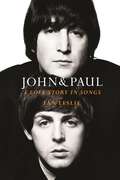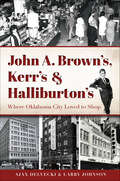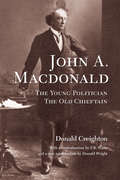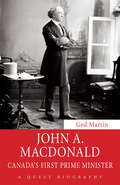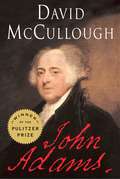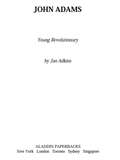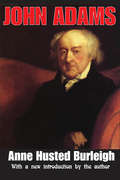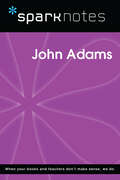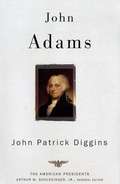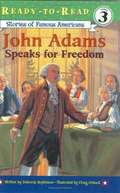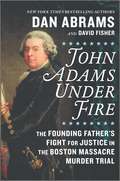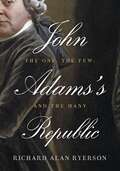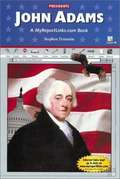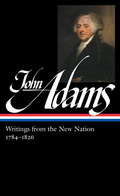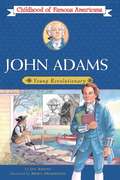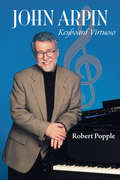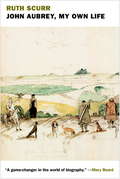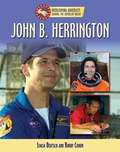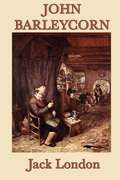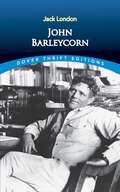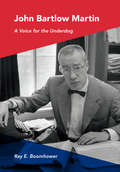- Table View
- List View
John & Paul: A Love Story in Songs
by Ian Leslie*INSTANT NEW YORK TIMES BESTSELLER*"We think we know everything, but author Ian Leslie proves otherwise. His new book, 'John & Paul: A Love Story in Songs,' is, astonishingly, one of the few to offer a detailed narrative of John Lennon and Paul McCartney’s partnership. And it’s a revelation." ―Los Angeles Times"It is stunning to follow Leslie’s insights into how far and fast John and Paul traveled, how profound their preternatural alliance was, and how epic their heroic journey. I’m sorry John isn’t here to read this book. I hope if Paul does read it he feels the depth of appreciation and gratitude and intelligence it contains." ―The New York TimesJohn Lennon and Paul McCartney knew each other for twenty-three years, from 1957 to 1980. This book is the myth-shattering biography of a relationship that changed the cultural history of the world.The Beatles shook the world to its core in the 1960’s and, to this day, new generations continue to fall in love with their songs and their story. At the heart of this phenomenon lies the dynamic between John Lennon and Paul McCartney. Few other musical partnerships have been rooted in such a deep, intense and complicated personal relationship. John and Paul’s relationship was defined by its complexity: compulsive, tender and tempestuous; full of longing, riven by jealousy. Like the band, their relationship was always in motion, never in equilibrium for long. John & Paul traces its twists and turns and reveals how these shifts manifested themselves in the music. The two of them shared a private language, rooted in the stories, comedy and songs they both loved as teenagers, and later, in the lyrics of Beatles songs.In John & Paul, acclaimed writer Ian Leslie uses the songs they wrote to trace the shared journey of these two compelling men before, during, and after The Beatles. Drawing on recently released footage and recordings, Leslie offers us an intimate and insightful new look at two of the greatest icons in music history, and rich insights into the nature of creativity, collaboration, and human intimacy.
John A. Brown's, Kerr's & Halliburton's: Where Oklahoma City Loved to Shop (Landmarks)
by Larry Johnson Ajax DelveckiDepartment stores John A. Brown's, Kerr's and Halliburton's ruled supreme in Oklahoma City. From "lucky penny" giveaways to defying blue laws, the three big department stores did whatever it took to entertain and entice. The stunning display windows of Kerr's downtown once lured shoppers inside, but the closing of Halliburton's in 1961 signaled the final days of downtown shopping. Adoption fairs and civil rights sit-ins at Brown's wove the store into the social fabric of the city. Authors Ajax Delvecki and Larry Johnson chronicle the stories, history and memories of the best of Oklahoma City shopping.
John A. MacDonald: The Young Politician, The Old Chieftain (Rich: Reprints In Canadian History Ser.)
by Donald Creighton Donald Wright Peter WaiteFirst published in 1952 and 1955, John A. Macdonald: The Young Politician, The Old Chieftain remains a classic in Canadian arts and letters. Described as the greatest biography ever written in Canada, it earned Donald Creighton two Governor General's Awards. In 2013, the Toronto Review of Books recommended it to anyone who wished to become a better Canadian. In this book, Creighton examines the public and private lives of Canada’s first prime minister, his victories and defeats as well as his joys and pains. A gifted writer, Creighton takes the reader back in time, to the nineteenth century, the road to Confederation, and the building of the railway. Along the way, he visits Kingston, Quebec, Charlottetown, Ottawa, and London, following his hero from a few rooms above his father’s shop in Kingston to the corridors of power in England, including the magnificent Highclere Castle where much of the British North America Act was written. This edition includes a new introduction by Creighton's biographer, Donald Wright, and by Peter Waite, Creighton's very first doctoral student.
John A. Macdonald: Canada's First Prime Minister
by Ged MartinA biography of Canada’s first prime minister, a legendary political strategist who helped found a new nation in 1867. Shocked by Canada’s 1837 rebellions, John A. Macdonald sought to build alliances and avoid future conflicts. Thanks to financial worries and an alcohol problem, he almost quit politics in 1864. The challenge of building Confederation harnessed his skills, and in 1867 he became the country’s first prime minister. As "Sir John A.," he drove the Dominion’s westward expansion, rapidly incorporating the Prairies and British Columbia before a railway contract scandal unseated him in 1873. He conquered his drinking problem and rebuilt the Conservative Party to regain power in 1878. The centrepiece of his protectionist National Policy was the transcontinental railway, but a western uprising in 1885 was followed by the controversial execution of rebel leader Louis Riel. Although dominant nationally, Macdonald often cut ethical corners to resist the formidable challenge of the Ontario Liberals in his own province. John A. Macdonald created Canada, but this popular hero had many flaws.
John Adams
by David McCulloughThe Pulitzer Prize–winning, bestselling biography of America&’s founding father and second president that was the basis for the acclaimed HBO series, brilliantly told by master historian David McCullough.In this powerful, epic biography, David McCullough unfolds the adventurous life journey of John Adams, the brilliant, fiercely independent, often irascible, always honest Yankee patriot who spared nothing in his zeal for the American Revolution; who rose to become the second president of the United States and saved the country from blundering into an unnecessary war; who was learned beyond all but a few and regarded by some as “out of his senses”; and whose marriage to the wise and valiant Abigail Adams is one of the moving love stories in American history. This is history on a grand scale—a book about politics and war and social issues, but also about human nature, love, religious faith, virtue, ambition, friendship, and betrayal, and the far-reaching consequences of noble ideas. Above all, John Adams is an enthralling, often surprising story of one of the most important and fascinating Americans who ever lived.
John Adams
by Meryl Henderson Jan AdkinsDear Reader: The Childhood of Famous Americans series, seventy years old in 2002, chronicles the early years of famous American men and women in an accessible manner. Each book is faithful in spirit to the values and experiences that influenced the person¹s development. History is fleshed out with fictionalized details, and conversations have been added to make the stories come alive to today¹s reader, but every reasonable effort has been made to make the stories consistent with the events, ethics, and character of their subjects. These books reaffirm the importance of our American heritage. We hope you learn to love the heroes and heroines who helped shape this great country. And by doing so, we hope you also develop a lasting love for the nation that gave them the opportunity to make their dreams come true. It will do the same for you. Happy Reading! The Editors
John Adams (American Presidents Ser.)
by Anne Burleighman for the ages. John Adams, philosopher of the Revolution and early America, and participant in many of the major events of that period, strove to fi nd universal patterns in the lives of all men. His life and ideas are as pertinent to our time as they were to his own. We still ponder the nature of the unbreakable bond between liberty and law. As did Adams, we question how to relate the goal of freedom to the authority necessary in political society.
John Adams (SparkNotes Biography Guide)
by SparkNotesJohn Adams (SparkNotes Biography Guide) Making the reading experience fun! SparkNotes Biography Guides examine the lives of historical luminaries, from Alexander the Great to Virginia Woolf. Each biography guide includes:An examination of the historical context in which the person lived A summary of the person&’s life and achievements A glossary of important terms, people, and events An in-depth look at the key epochs in the person&’s career Study questions and essay topics A review test Suggestions for further reading Whether you&’re a student of history or just a student cramming for a history exam, SparkNotes Biography guides are a reliable, thorough, and readable resource.
John Adams (The American Presidents Series)
by Arthur M. Schlesinger John P. DigginsJohn Adams is overshadowed by Washington and Jefferson. Adams seemed temperamentally unsuited for the presidency. Yet in many ways he was the perfect successor to Washington in terms of ability, experience, and popularity.
John Adams Speaks for Freedom
by Deborah HopkinsonJohn Adams didn't enjoy traveling. He much preferred to stay home with his wife and children. But John Adams also had a dream: He wanted to see the thirteen colonies free from English rule. He wanted to see the creation of a new country -- the United States of America. John Adams did whatever was needed to make his dream come true.
John Adams Under Fire: The Founding Father's Fight for Justice in the Boston Massacre Murder Trial
by David Fisher Dan AbramsThe New York Times bestselling author of Lincoln’s Last Trial and host of LivePD Dan Abrams and David Fisher tell the story of a trial that would change history. <P><P>History remembers John Adams as a Founding Father and our country’s second president. But in the tense years before the American Revolution, he was still just a lawyer, fighting for justice in one of the most explosive murder trials of the era.On the night of March 5, 1770, shots were fired by British soldiers on the streets of Boston, killing five civilians. <P><P>The Boston Massacre has often been called the first shots of the American Revolution. As John Adams would later remember, “On that night the formation of American independence was born.” Yet when the British soldiers faced trial, the young lawyer Adams was determined that they receive a fair one. He volunteered to represent them, keeping the peace in a powder keg of a colony, and in the process created some of the foundations of what would become United States law. <P><P>In this book, New York Times bestselling authors Dan Abrams and David Fisher draw on the trial transcript, using Adams’s own words to transport readers to colonial Boston, a city roiling with rebellion, where British military forces and American colonists lived side by side, waiting for the spark that would start a war. <P><P><b>A New York Times Bestseller</b>
John Adams's Republic: The One, the Few, and the Many
by Richard Alan RyersonThis trailblazing study explores Adams’s political thought across his entire career in law and public service.Winner of the Sally and Morris Lasky Prize of The Center for Political History Lebanon Velley CollegeScholars have examined John Adams’s writings and beliefs for generations, but no one has brought such impressive credentials to the task as Richard Alan Ryerson in John Adams’s Republic. The editor-in-chief of the Massachusetts Historical Society’s Adams Papers project for nearly two decades, Ryerson offers readers of this magisterial book a fresh, firmly grounded account of Adams’s political thought and its development.Of all the founding fathers, Ryerson argues, John Adams may have worried the most about the problem of social jealousy and political conflict in the new republic. Ryerson explains how these concerns, coupled with Adams’s concept of executive authority and his fear of aristocracy, deeply influenced his political mindset. He weaves together a close analysis of Adams’s public writings, a comprehensive chronological narrative beginning in the 1760s, and an exploration of the second president’s private diary, manuscript autobiography, and personal and family letters, revealing Adams’s most intimate political thoughts across six decades.How, Adams asked, could a self-governing country counter the natural power and influence of wealthy elites and their friends in government? Ryerson argues that he came to believe a strong executive could hold at bay the aristocratic forces that posed the most serious dangers to a republican society. The first study ever published to closely examine all of Adams’s political writings, from his youth to his long retirement, John Adams’s Republic should appeal to everyone who seeks to know more about America’s first major political theorist.
John Adams: A MyReportLinks.com Book
by Stephen Feinstein- Covers the lives, accomplishments, and political careers of the American presidents. - Pre-evaluated Report Links back up each book.
John Adams: Volume I - 1735-1784
by Page SmithThis is the first volume of the biography of an American politician and the second President of the United States, after being the first Vice President for two terms who is regarded as one of the most influential Founding Fathers of the United States. The period covered in the first volume being 1735-1784.
John Adams: Volume II - 1784-1826
by Page SmithThis is the second volume of the biography of an American politician and the second President of the United States, after being the first Vice President for two terms who is regarded as one of the most influential Founding Fathers of the United States. The period covered in the first volume being 1784-1826.
John Adams: Writings from the New Nation, 1784-1826
by Gordon S. Wood John AdamsGordon S. Wood presents the final volume in his definitive three-volume edition of the writings of a great American Founder. <P> <P> A powerful polemicist, insightful political theorist, and tireless diplomat, John Adams (1735-1826) was a vital and controversial figure during the early years of the American republic. Once overshadowed by Washington and Jefferson, Adams has become the subject of renewed interest, with a best-selling biography and acclaimed television series reintroducing him to millions. Now, this final volume of a comprehensive three-volume edition makes his important writings from the early national period broadly available to general readers. Bringing together letters, diary excerpts, political essays, speeches, and presidential messages, Writings from the New Nation 1784-1826 illuminates Adams's service as a diplomat in the Netherlands and England; his eight years as vice president under Washington; and his tumultous single term as president. The first person to win a contested presidential election and then to be defeated for reelection, Adams faced bitter criticism from both Jeffersonian Republicans and Hamiltonian Federalists while striving to prevent an undeclared naval conflict with Revolutionary France from escalating into full-scale war. Selections from A Defence of the Constitutions of Government of the United States of America (1787-88) and Discourses on Davila (1790-91) demonstrate his insights into the strengths and weaknesses of ancient and modern political systems, while letters to his wife and children illuminate the passionate and mercurial personality of one of our most fascinating Founders. This volume is published simultaneously with Abigail Adams: Letters, the first comprehensive collection of the extraordinary correspondence of Adams's wife and key advisor.From the Hardcover edition.
John Adams: Young Revolutionary
by Jan E. AdkinsChildren's biography of the second President of the United States.
John Arpin: Keyboard Virtuoso
by Robert PoppleBorn and raised in Port McNicoll, John Arpin discovered his musical talents early: at the age of four he could pick out tunes on the piano that he had heard on the radio; by ten, he had been identified as a child prodigy by a Royal Conservatory of Music adjudicator. He would go on to become one of Canada’s finest keyboard virtuosos, playing at concert halls around the world. Equally at ease performing solo piano concerts, being accompanied by a full symphony orchestra, jamming with jazz greats, or accompanying opera singers, he was, perhaps, best known as the premier ragtime pianist of his day. This authorized biography is based on more than 40 hours of conversation during the last four years of John’s life and supported by extensive research. Included are his friendships with Glenn Gould, Gordon Lightfoot, and others, his years as the designated artist for Yamaha, and his rise to prominence as a veteran of the concert stage. His stories represent pure Canadian music history.
John Aubrey, My Own Life
by Ruth ScurrBorn on the brink of the modern world, John Aubrey was witness to the great intellectual and political upheavals of the seventeenth century. He knew everyone of note in England--writers, philosophers, mathematicians, doctors, astrologers, lawyers, statesmen--and wrote about them all, leaving behind a great gift to posterity: a compilation of biographical information titled Brief Lives, which in a strikingly modest and radical way invented the art of biography.Aubrey was born in Wiltshire, England, in 1626. The reign of Queen Elizabeth and, earlier, the dissolution of the monasteries were not too far distant in memory during his boyhood. He lived through England's Civil War, the execution of Charles I, the brief rule of Oliver Cromwell and his son, and the restoration of Charles II. Experiencing these constitutional crises and regime changes, Aubrey was impassioned by the preservation of traces of Ancient Britain, of English monuments, manor houses, monasteries, abbeys, and churches. He was a natural philosopher, an antiquary, a book collector, and a chronicler of the world around him and of the lives of his friends, both men and women. His method of writing was characteristic of his manner: modest, self-deprecating, witty, and concerned above all with the collection of facts that would otherwise be lost to time.John Aubrey, My Own Life is an extraordinary book about the first modern biographer, which reimagines what biography can be. This intimate diary of Aubrey's days is composed of his own words, collected, collated, and enlarged upon by Ruth Scurr in an act of meticulous scholarship and daring imagination. Scurr's biography honors and echoes Aubrey's own innovations in the art of biography. Rather than subject his life to a conventional narrative, Scurr has collected the evidence--the remnants of a life from manuscripts, letters, and books--and arranged it chronologically, modernizing words and spellings, and adding explanations when necessary, with sources provided in the extensive endnotes. Here are Aubrey's intricate drawings of Stonehenge and the ancient Avebury stones; Aubrey on Charles I's execution ("On this day, the King was executed. It was bitter cold, so he wore two heavy shirts, lest he should shiver and seem afraid"); and Aubrey on antiquity ("Matters of antiquity are like the light after sunset--clear at first--but by and by crepusculum--the twilight--comes--then total darkness"). From the darkness, Scurr has wrested a vibrant, intimate account of the life of an ingenious man.
John Audubon and the World of Birds for Kids: His Life and Works, with 21 Activities (For Kids series #76)
by Michael Elsohn RossJohn James Audubon's passion for birds inspired a national movement to protect birds and their habitats. As a child, John would often skip school to roam the countryside. He collected bird nests, unique stones, bits of moss, and other items of interest and developed his talent for creating dramatic bird portraits and skills for observing them in the wild. Using his abilities as an acute observer, skilled writer, and exceptional artist, Audubon wrote and illustrated a book, Birds of America. Cataloging all these creatures took enormous time and effort—but even more difficult was finding a way to publish it. To make his book a reality he had to persuade wealthy investors to support his dream. The stories of his adventures pursuing the unique birds of the America captured the imagination of audiences. Audubon became a larger-than-life figure and dubbed himself "the American Woodsman." Years after his death his artwork is still considered a major accomplishment that inspired a greater interest in American birdlife.John Audubon and the World of Birds for Kids includes 21 hands-on activities and valuable resources for budding ornithologists hiking in his footsteps.
John B. Herrington
by Stacia Deutsch Rhody CohonEach book in the "Sharing the American Dream: Overcoming Adversity" series features a biography of the challenges these people faced during their lives. The series is interesting, lively, accurate, factual, and up-to-date. Information about each celebrity's personal lives and romantic relationships, in addition to his or her professional achievements is included, as well as individual philanthropic efforts.
John Barleycorn
by Jack LondonJohn Barleycorn is an autobiographical novel by Jack London dealing with his enjoyment of and struggles with alcoholism. It was published in 1913. The title is taken from the British folksong "John Barleycorn."
John Barleycorn: Alcoholic Memoirs (Dover Thrift Editions)
by Jack LondonAs close to an autobiography as Jack London ever wrote, John Barleycorn recounts the author's lifelong struggle with alcohol. In this brutally honest memoir, which takes its title from the British folksong that personifies the source of whiskey and beer, London writes of alcohol as his friend and his enemy, an "august companion" and a "red-handed killer." In an age when alcoholism was viewed as a genetic weakness, London's frank, ahead-of-its-time treatment of his struggles tarnished his sterling reputation as a paragon of all-American manhood. The book created a sensation upon its 1913 publication and became a powerful tool of the temperance movement. More than a screed against demon rum, however, the tale recounts London's years as a sailor, explorer, and frontiersman up and down the West Coast, from Southern California to Alaska. Rich in anecdotes and written in a captivating style, the book also offers compelling insights into London's life as a rugged adventurer and popular writer.
John Bartlow Martin
by Ray E. BoomhowerDuring the 1940s and 1950s, one name, John Bartlow Martin, dominated the pages of the "big slicks," the Saturday Evening Post, LIFE, Harper's, Look, and Collier's. A former reporter for the Indianapolis Times, Martin was one of a handful of freelance writers able to survive solely on this writing. Over a career that spanned nearly fifty years, his peers lauded him as "the best living reporter," the "ablest crime reporter in America," and "one of America's premier seekers of fact." His deep and abiding concern for the working class, perhaps a result of his upbringing, set him apart from other reporters. Martin was a key speechwriter and adviser to the presidential campaigns of many prominent Democrats from 1950 into the 1970s, including those of Adlai Stevenson, John F. Kennedy, Lyndon B. Johnson, Robert F. Kennedy, Hubert Humphrey, and George McGovern. He served as U.S. ambassador to the Dominican Republic during the Kennedy administration and earned a small measure of fame when FCC Chairman Newton Minow introduced his description of television as "a vast wasteland" into the nation's vocabulary.
John Bascom and the Origins of the Wisconsin Idea
by J. David HoevelerIn the Progressive Era of American history, the state of Wisconsin gained national attention for its innovative economic and political reforms. Amidst this ferment, the "Wisconsin Idea" was popularized--the idea that a public university should improve the lives of people beyond the borders of its campus. Governor Robert La Follette routinely consulted with University of Wisconsin researchers to devise groundbreaking programs and legislation. Although the Wisconsin Idea is often attributed to a 1904 speech by Charles Van Hise, president of the University of Wisconsin, David Hoeveler argues that it originated decades earlier, in the creative and fertile mind of John Bascom. A philosopher, theologian, and sociologist, Bascom deeply influenced a generation of students at the University of Wisconsin, including La Follette and Van Hise. Hoeveler documents how Bascom drew concepts from German idealism, liberal Protestantism, and evolutionary theory, transforming them into advocacy for social and political reform. He was a champion of temperance, women's rights, and labor, all of which brought him controversy as president of the university from 1874 to 1887. In a way unmatched by any leader of a major American university in his time, Bascom outlined a social gospel that called for an expanded role for state governments and universities as agencies of moral improvement. Hoeveler traces the intellectual history of the Wisconsin Idea from the nineteenth century to such influential Progressive Era thinkers as Richard T. Ely and John R. Commons, who believed university researchers should be a vital source of expertise for government and citizens.
